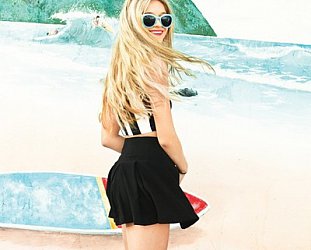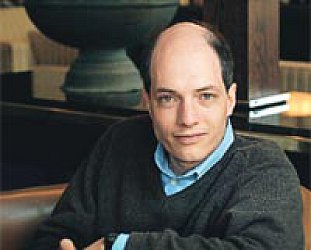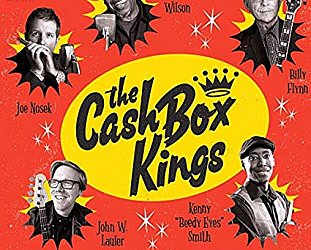Graham Reid | | 3 min read
The Fourmyula: Please Take Me (1969)

In his recent book 100 Essential New Zealand Albums, the writer/broadcaster Nick Bollinger lists three albums by the Fourmyula (1967-71) out of Upper Hutt.
Not bad for a band that only released three -- and one of those Bollinger cites was the unreleased Turn Your Back on the Wind.
Confused?
Bollinger doesn't list their self-titled debut but includes Turn Your Back because it has only just come out as part of this impressive four-CD collection -- for which he wrote the excellent band biography in the extensive liner notes.
In the past decade the band's star rose on the back of songwriter Wayne Mason's Nature being voted the best New Zealand song of the previous 75 years. That lead to attention being thrown on their other singles (notably Come With Me and the trippy Alice is There) and an appreciation of how far they moved musically (from poppy mid-Sixties Beatles to heavy Cream) in such a short period.
The first disc here scoops up the singles and B-side and so is a fast trip through that short career and what impresses is how they mastered the single format (short and memorable songs with hooks and choruses) and how versatile they were: here back-to-back are the phasing-coloured original I Know Why and their somewhat over-dramatic cover of the country standard It's Only Make Believe.
They indulged in that late Sixties English whimsy on songs like She's A ?
They were also a band that insisted on recording originals -- and without embarrassment referenced Otaki in the song of the same name.
The second disc puts together their '68 self-titled debut and the follow-up Green "B" Holiday. The former collected their singles of the time (Alice is There, Honey Chile) with covers (Whatcha Gonna Do), some oddities (Mr Whippy, Have You Heard the News) and live favourites (the stinging Try Me, Hitch it to the Horse).
But by the time they came to Green "B" Holiday they were a much more mature and different band. And it was a concept album about traveling around New Zealand in the van of the title (with a few nasal Kiwi conversational snippets).
They were not only musically ambitious (horns, strings, delicate folk ballads, psychedelica-lite) but as instrumentalists they were also years ahead of their peers as witnessed by Hampden Tennis Club with its chugging acoustic guitars, deft drum and piano parts and clever I Am the Walrus-like arrangement.
Songs like Cozy Picture Theatre had the observational quality of Ray Davies and at times (notably Home) they recall the early Bee Gees more than the Beatles who had been their original inspiration. It is a delightful period-piece.
For their Creation album of '69 (the third disc here, with live recordings at the end) they were a different band again: by then they had been to the UK on a cruise ship (they'd won their tickets, the deal was they would play every night); had tasted the scene in London; spent a day at Abbey Road (and briefly met the Beatles, Lennon telling Mason they came "from the land of butter"); and had returned home broke.
There is a sense that the band has tightened and toughened, although they still knew pop economy at a time when others were spiralling out into lengthy jams. Influences are now the latter-day Small Faces, the Nice, Traffic and UK blues-rock -- and Mason's organ playing comes to the fore (the Whiter Shade of Pale-like Orphan) alongside Martin Hope's assertive guitar (Bluesberry Road lead by Carl Evensen's raw vocals).
Yet there is also a melancholy ache to much of the material (Patterns of Life, I Need Your Love, Home to My Lady) or an anger (I Don't Care) . . . but it ends on the double whammy of the handclap white-soul-cum-gospel of Oh Lord I'm Coming There and then the redemptive Nature.
The live tracks are even more aggressive (Walking in the Park, their organ-driven soul-shout version of Daytripper) . . . and Mason penned a song entitled Let It Be? That's courageous.
Then there is Turn Your Back on the Wind, unreleased for four decades and recorded in London shortly after their single Nature took off back home in their absence. Influenced by the heavier sound of emerging British rock, Turn Your Back shows how far and fast they had travelled.
The influence of Stevie Marriott's raw, throat-rippping style is here in some of Evensen's singing (Please Take Me, Everything) as is the elemental thump of early Led Zeppelin (Up Country City Down) and boogie-rock'n'roll (Molly, You Lost Your Woman)
Yet there is also that delicacy for which they were also known (the pastoral moods of A Friend and Wrong or Right, a UK re-recording of Nature -- clip below -- which isn't really a patch on the spare and more affecting original) and the gloriously uplifting, string-elevated title track.
Although Turn Your Back on the Wind isn't a coherent collection of songs because of the stylistic diversity it is worth remembering that is how albums were conceived at the time. And this one does stand up alongside what their peers in the UK were doing -- and was some distance from and beyond many New Zealand acts.
But by that time the band had run out of puff and money, and so it gradually fell apart.
And so there it is: a lot of music from the five-piece Fourmyula.
This is a beautifully packaged set from the CD labels to the colourful booklet (hats off to Bollinger and New Zealand's great unacknowledged archivist Grant Gillanders), and of course the breadth and depth of the music.
Three entries in Nick Bollinger's 100 Essential New Zealand albums? Here's the persuasive evidence.







post a comment